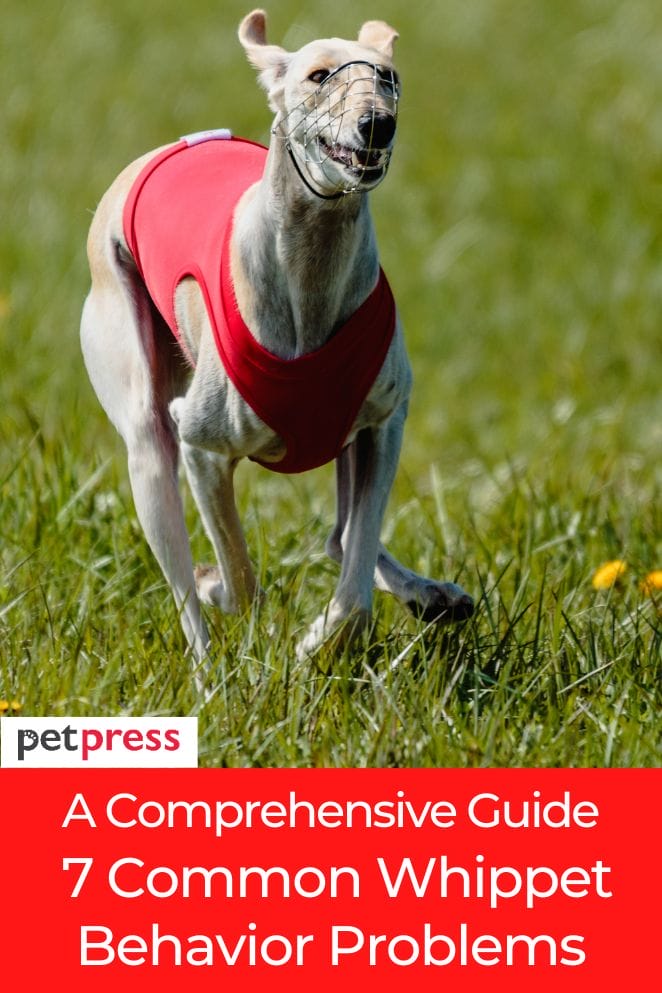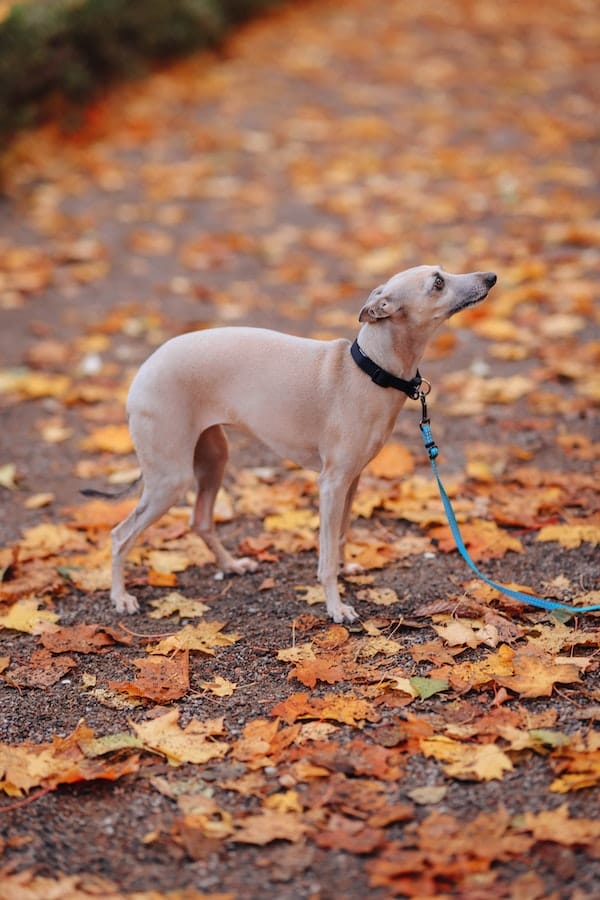
Welcome to our in-depth guide on comprehending and handling the typical behavior issues that may arise with Whippets.
These delightful and lively dogs, while incredibly charming, may occasionally present challenging behaviors.
However, armed with the correct insights and effective techniques, you can cultivate a harmonious bond with your beloved furry companion.
Common Whippet Behavior Problems
Whippets, known for their grace and athleticism, can also display various behavior issues. Some of the common problems include:
Separation anxiety
Whippets are known for their affectionate nature, and this attachment can lead to separation anxiety.
When left alone, they may struggle with feelings of distress, which can manifest in destructive behavior.
Understanding and addressing their anxiety is crucial for a harmonious relationship.
Excessive barking
Despite their grace, Whippets can be rather vocal.
Some individuals may have a tendency to bark excessively, which, while not uncommon among dogs, can become a nuisance if not managed.
Finding the underlying reasons for their barking and employing training techniques can help curb this behavior.
Chasing instinct
Whippets have an inherent prey drive that’s hard to ignore.
Their strong urge to chase small animals or even vehicles can pose challenges, particularly during off-leash activities.
Training and consistent recall commands are essential to manage this instinct and ensure their safety.
Stubbornness
Whippets may occasionally exhibit stubbornness, thanks to their independent streak.
This doesn’t mean they can’t be trained; it just means they may require a bit more patience and creative training methods to keep them engaged and responsive.
Chewing
Whippets have a natural affinity for chewing.
It’s an instinct deeply ingrained in their canine DNA.
While this behavior is entirely normal, it can turn destructive if not properly managed.
To keep your furniture and belongings safe from their chewing tendencies, providing them with suitable chew toys and training them on what’s acceptable to chew can be incredibly helpful.
Digging
Another instinctive behavior in Whippets is digging.
Their strong desire to unearth hidden treasures or create cozy resting spots can indeed be endearing.
However, uncontrolled digging can wreak havoc on your garden or yard.
To strike a balance, consider allocating a specific area for them to indulge in their digging urges, complete with soft soil and toys.
Pulling on the leash
Whippets are known for their strength, and when they decide to pull on the leash during walks, it can be quite a workout for the owner!
It’s crucial to address this issue early on, not only for your comfort but also for the safety of your dog.
Proper leash training techniques, along with the right equipment, can help curb this tendency and make walks more enjoyable for both you and your Whippet.

Root Causes of Whippet Behavior Problems
Understanding the root causes of these behavior problems is crucial for effective management. Some of the factors contributing to Whippet’s behavior issues include:
Breed traits
Whippets are inherently sighthounds, which means they are wired to react strongly to visual stimuli, particularly when they spot something moving.
These instincts, deeply ingrained in their breed, can drive much of their behavior, such as chasing after small animals or even vehicles.
Recognizing and respecting these breed traits is essential in understanding their actions.
Lack of stimulation
Whippets are an active and intelligent breed.
Without sufficient mental and physical stimulation, they can become bored and restless.
This pent-up energy can manifest in various ways, including destructive chewing or digging.
Ensuring they have engaging activities and exercise routines is crucial to keep them content.
Socialization
Proper socialization during a Whippet’s puppyhood is pivotal for their well-rounded development.
Inadequate socialization can lead to anxiety and fear-based behaviors.
Whippets are generally known for their gentle and friendly nature, but early socialization helps reinforce these positive traits and minimizes the likelihood of anxiety-driven issues.
Tips for Managing Whippet Behavior Problems
Let’s delve into some actionable strategies to effectively manage and address behavior challenges in Whippets:
Structured routine
Whippets thrive on routine.
Establishing a consistent daily schedule can provide them with a sense of security and predictability.
Regular feeding times, exercise routines, and sleep schedules can go a long way in creating a stable environment for your Whippet.
Positive reinforcement
When it comes to training, opt for positive reinforcement techniques.
Use rewards such as treats, praise, and affection to reinforce desired behaviors.
Whippets are intelligent dogs and respond well to positive reinforcement, making training sessions more effective and enjoyable for both of you.
Training and socialization
Investing in training and early socialization is paramount.
Enroll your Whippet in obedience classes and expose them to various people, animals, and environments during their puppyhood.
This helps them develop into well-mannered and confident companions.

Exercise
Whippets are a high-energy breed and need plenty of exercise to channel their energy positively.
Regular playtime, walks, and even agility training can help keep them physically and mentally stimulated.
An active Whippet is often a well-behaved one.
Avoid using punishment
Punishment is not an effective method for training dogs and can often backfire, making behavior problems worse.
Instead, focus on positive reinforcement to encourage and reward good behavior.
This approach helps build a strong bond between you and your furry friend and fosters a more cooperative attitude.
Be patient and consistent
Training a dog, especially a Whippet, requires patience and consistency.
It’s essential to understand that behavioral changes take time, and you may not see immediate results.
Stay committed to your training efforts, and over time, your dog will grasp what’s expected and adapt accordingly.
Consistency in your commands and rewards is key to reinforcing desired behavior.
Conclusion
To sum things up, it’s important to remember that Whippets, despite their occasional behavior challenges, have a lot of love and loyalty to offer as pets.
By delving into the underlying causes of their behavior and putting in place effective management strategies, you can embark on a rewarding journey of companionship with your Whippet, filled with joy and fulfillment.
FAQs
Whippets are generally good with children and can be affectionate family pets. However, supervision is crucial, especially with younger children, due to their sensitive nature.
Yes, Whippets are an active breed and need regular exercise to stay happy and healthy. Daily walks and playtime are essential.
Whippets may struggle with separation anxiety if left alone for extended periods. It’s advisable to provide them with companionship or consider doggy daycare.
Addressing the root cause of the barking, such as loneliness or boredom, can help reduce excessive barking. Training and positive reinforcement can also be effective.


GIPHY App Key not set. Please check settings